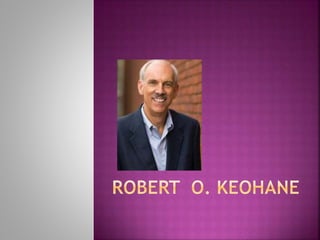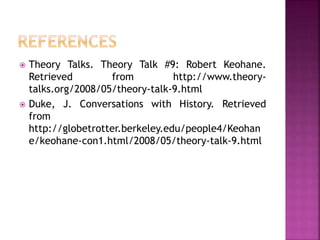Keohane
- 2. ? Born (1941) and raised in Chicago. ? Both parents were social scientists. ? Father was a professor and politician. ? Mother was the leader of the League of Women Voters. ? Left a social democrat impression on him. ? Graduated in 1961 ? Kennedy innagutarion speech ? democracy ? look for better alternatives to communism.
- 3. ? ?I don¡¯t think we can seek predictions? ? ?You have to looks for the understanding of the underlying dynamics? ? ?You have to like attacking conventional wisdom [Realism]? ? 1970¡¯s ? Institutional cooperation ? Institutions increase credibility, reduce uncertainty and reduce costs.
- 4. ? After Hegemony: Cooperation and Discord in the World Political Economy (1984) ? Neoliberal institutionalism ? Ideas and Foreign Policy (1993) ? Connections among interests, ideas and institutions ? Power and Governance in a Partially Globalized World (2002) ? Political theory
- 5. ? Theory Talks. Theory Talk #9: Robert Keohane. Retrieved from http://www.theory-talks. org/2008/05/theory-talk-9.html ? Duke, J. Conversations with History. Retrieved from http://globetrotter.berkeley.edu/people4/Keohan e/keohane-con1.html/2008/05/theory-talk-9.html


![? ?I don¡¯t think we can seek predictions? ?
?You have to looks for the understanding of
the underlying dynamics?
? ?You have to like attacking conventional
wisdom [Realism]?
? 1970¡¯s ? Institutional cooperation
? Institutions increase credibility, reduce
uncertainty and reduce costs.](https://image.slidesharecdn.com/keohane-141202082559-conversion-gate01/85/Keohane-3-320.jpg)

